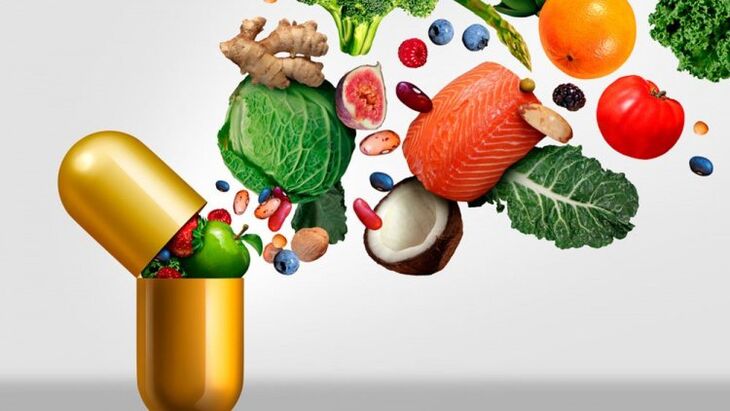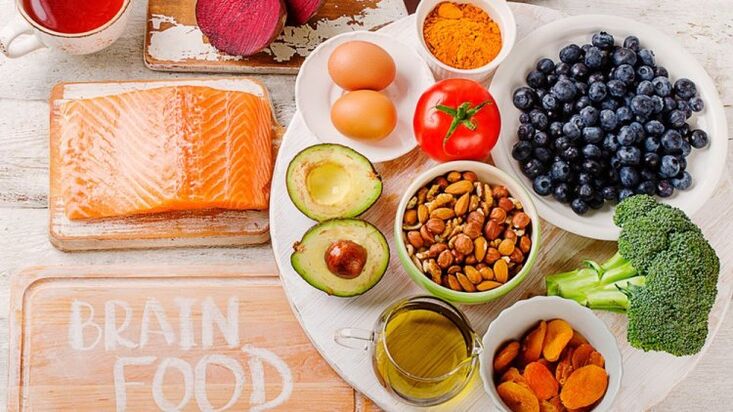Lack of vitamins in the human body negatively affects the functioning of the brain and leads to cognitive impairment. The main symptoms of vitamin deficiency are loss of the ability to receive and remember information, mood swings, forgetfulness, lack of intelligence, lethargy, fatigue, and bad mood.
To prevent this, take vitamins regularly and supplement your diet with foods that improve brain function.
What is the role of vitamins
The root under the word "vitamins" means life. In fact, the body's ability to function properly and efficiently depends on how much organic matter we digest through food.
Vitamins help the body perform the following functions:
- They strengthen and improve the strength and elasticity of tissues, including vascular walls, and produce collagen. This leads to improved blood formation and nourishes the brain.
- Redox - promotes the acceleration of reactions, thereby increasing metabolism, the release of energy from proteins, fats and carbohydrates.
- Because of their antioxidant properties, they prevent the breakdown of cells by the products of biochemical reactions.
In order to maintain the active function of the brain, it is necessary to constantly monitor the vitamin-mineral balance. And in case of deficiency, replenish the supply of vitamins by choosing the right food and taking vitamin complexes containing various low-molecular organic compounds.
What vitamins the brain needs

Cognitive brain function is more common with age. Among the causes of this condition are endocrine disorders (thyroid gland, metabolism), pathologies of the digestive system, frequent stress and physical activity that require high energy expenditure. In this case, vitamins should help. Of these, the most important are the ones that enable the brain to function effectively. These include:
Beta carotene
The yellow-orange pigment, which is converted into vitamin A, protects brain cells, prevents the loss of cognitive function, and promotes the development of memory. Lack of pigment threatens the pathology of the visual organs, adversely affects the growth and development of childhood.
Vitamins B.
They are represented by a whole group and each of its representatives is of great importance for the human body:
- thiamine (B1) promotes the absorption of carbohydrates and stores energy, the lack of which disrupts the digestive system;
- riboflavin (B2) promotes efficient absorption of oxygen, reduces fatigue and provides energy to the body;
- Nicotinic acid (B3) - a powerful antioxidant, dilates blood vessels, is indicated for use in cases of impaired blood supply;
- Pantothenic acid (B5) - is involved in the metabolism of proteins, fats, carbohydrates, synthesizes acetylcholine, helps to transmit nerve impulses to the brain;
- pyridoxine (B6) - releases hormones responsible for cognitive processes, breaks down proteins and synthesizes enzymes necessary for the formation of new cells;
- folic acid (B9) - promotes cell proliferation, the formation of serotonin, adrenaline, dopamine is necessary for the development of the fetus in pregnant women;
- Cyanocobalamin (B12) - lowers bad cholesterol, strengthens blood vessel walls, is involved in the synthesis of amino acids and DNA.
Ascorbic acid (vitamin C)
Prevents the degradation of brain cells and helps the gland to absorb better. In combination with tocopherols, it is used in the treatment of pathologies associated with circulatory disorders, reduces the risk of malignant tumors.
Calciferol (vitamin D)
It activates the assimilation of phosphorus and calcium, which are part of brain cells, improves cognitive abilities (memory, attention), mood. Lack of this organic compound leads to the development of cognitive impairment.
Vitamin K
It is represented by a group of fat-soluble compounds responsible for the functioning of blood vessels and blood clotting - phylloquinone (K1) and menacuinone (K2). With its help, calcium is easily absorbed. Deficiency can lead to vascular occlusion, amnesia, and hematopoiesis.
Tocopherol (Vitamin E)
As a powerful antioxidant, it protects nerve cells from toxins and free radicals, improves memory and slows down aging.
Polyunsaturated fats, also known as omega-3 fats, also help improve brain function. They affect neuroplasticity, increase concentration and reduce the risk of developing Alzheimer's disease.
Foods for better brain function

The brain's main function is to give commands to perform important bodily functions. He needs to eat well to continue his well-coordinated work. Food should contain useful vitamins and minerals.
Here is a list of brain nutrients that should always be included in your diet:
- Nuts (walnuts, pine, almonds): polyunsaturated acids, vitamins B1, B2, C, carotene, as well as iron, iodine, magnesium, zinc, etc.
- Fruits (blueberries, currants, cranberries, strawberries): improves memory and vision, prevents cardiovascular pathology, increases efficiency.
- Eggs (chicken, quail): rich in lutein, prevents the development of heart attacks and strokes. Doctors recommend eating no more than 2 meals a day.
- High-quality dark chocolate: in moderation stimulates brain activity, improves oxygen supply, dilates blood vessels. Magnesium and phosphorus in it contribute to the nutrition of cells.
- Carrots: Prevents aging by damaging brain cells.
- Measles: Increases blood flow to the brain and helps improve mental performance.
- Seaweed contains iodine, which helps fight irritability, insomnia, depression and amnesia.
- Fatty sea fish (mackerel, salmon, tuna): a source of omega-3 polyunsaturated fatty acids - good for the brain.
- Contains protein, selenium and B vitamins: chicken, turkey, beef.
- Spinach: a real storehouse of vitamins A, C, K, as well as iron - prevents the development of heart attacks and strokes.
- Legumes (lentils, beans): Provides a clear mind and speed of thought.
To organize the full functioning of the brain, it is necessary to follow the recommendations of nutritionists:
- Do not overeat - overeating promotes the formation of free radicals, which have a negative effect on brain cells;
- Eat small portions - 5-6 meals per day;
- fish in the diet should be at least 3 times a week;
- complex carbohydrates, fresh vegetables and fruits should be consumed daily until 16. 00;
- Avoid alcohol, caffeine, fatty foods, sweets and flour products.
Maintaining a work and rest regime, an active lifestyle, a balanced diet, and intake of vitamin-mineral complexes will keep your brain healthy for a long time.







































































